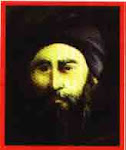
The Islamic World to 1600
Al-Farabi
Abu'l-Nasr Al-Farabi, a Muslim of Persian descent who studied in Baghdad, was considered in his time to be the greatest philosopher since Aristotle. Indeed, in the Islamic world he was known as the "Second Teacher," with Aristotle being the first. He was fluent in several languages, and through his translations of ancient Greek works, he was one of the earliest Islamic philosophers to introduce Greek philosophy to the Islamic world. He wrote on numerous subjects, including logic, sociology, political science, medicine, and music, but his legacy lies in his work in philosophy.
In writing commentaries on the works of the ancient Greeks, Al-Farabi sought to reconcile Aristotelian and Platonian thought with Islamic theology. At the same time, however, he also became the first Islamic philosopher to separate philosophy and theology, influencing scholars of many different religions who followed him. He concluded that human reason, the tool of the philosopher, was superior to revelation, the tool of religion, resulting in the advantage of philosophy over religion. He claimed that philosophy was based on intellectual perception, while religion was based on imagination. He thus attributed impressive characteristics to the philosopher, and advocated the philosopher as the ideal head of state. He blamed political upheavals in the Islamic world to the fact that the state was not run by philosophers, whose superior powers of reason and intellect would result in ideal leadership.
Al-Farabi's work greatly influenced the Islamic philosophers who followed him, particularly Ibn Sina and Ibn Rushd. It also sparked what would become an ongoing debate between representatives of philosophy and theology, as Islamic thinkers sought to reconcile disparities between the two fields.











No comments:
Post a Comment